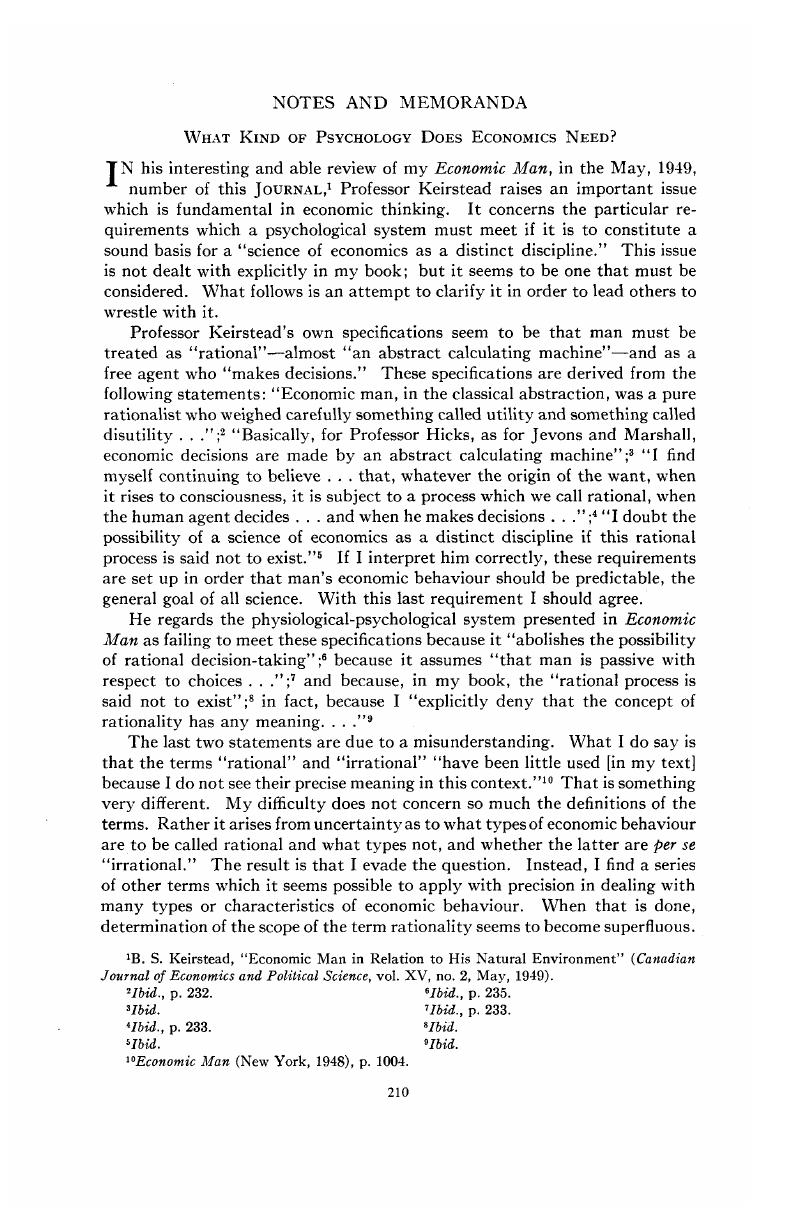Article contents
What Kind of Psychology Does Economics Need?
Published online by Cambridge University Press: 07 November 2014
Abstract

- Type
- Notes and Memoranda
- Information
- Canadian Journal of Economics and Political Science/Revue canadienne de economiques et science politique , Volume 16 , Issue 2 , May 1950 , pp. 210 - 215
- Copyright
- Copyright © Canadian Political Science Association 1950
References
1 Keirstead, B. S., “Economic Man in Relation to His Natural Environment” (Canadian Journal of Economics and Political Science, vol. XV, no. 2, 05, 1949).Google Scholar
2 Ibid., p. 232.
3 Ibid.
4 Ibid., p. 233.
5 Ibid.
6 Ibid., p. 235.
7 Ibid., p. 233.
8 Ibid.
9 Ibid.
10 Economic Man (New York, 1948), p. 1004.Google Scholar
11 Scientific Autobiography (New York, 1949), p. 178.Google Scholar
12 In fact, one cannot draw a line with respect to any mental process. As Max Planck puts it, “Along the entire ladder of evolution, from the lowest order of life up to Man, there is no point at which one can establish a discontinuity in the nature of mental processes” (ibid., p. 64).
13 In Economic Man, p. 658, I say that the operation of “future wants” is essentially “what is called rational”; that is, “dictated by ‘rational’ considerations.”
14 Macaulay, F. R., Bond Yields, Interest Rates and Stock Prices (New York, 1938).Google Scholar
15 Scientific Autobiography, p. 13.
16 Macaulay, makes the same point (Bond Yields, p. 10).Google Scholar
17 At best that analogy may be far-fetched. For, in spite of the new science of cybernetics, the great British neurophysiologist, Sir Charles Sherrington, thinks that, “between the calculating machine and the human brain there is no basic similarity (see New York Times, Dec. 4, 1949). Of course, ProfessorWiener, Norbert (Cybernetics, New York, 1948)Google ScholarPubMed would dispute that statement.
18 Principles of Psychology (New York, 1890, 1896), vol. II, pp. 532–4.Google Scholar
19 Feb., 1949, review of Gandhi’s Autobiography.
20 Principles of Psychology, vol. II, p. 571.Google Scholar
21 Ibid., p. 576.
22 Economic Man, App. III F.
23 Mankind So Far (New York, 1945).Google Scholar
24 Cybernetics, pp. 62-3.
25 In his presidential address on “Economics: Yesterday and Tomorrow?” before Section F of the British Association at the 112th Annual Meeting. See Economic Journal, vol. LIX, 12, 1949, p. 515.Google Scholar
- 1
- Cited by




